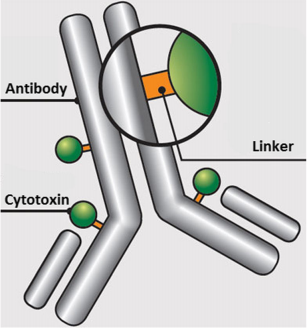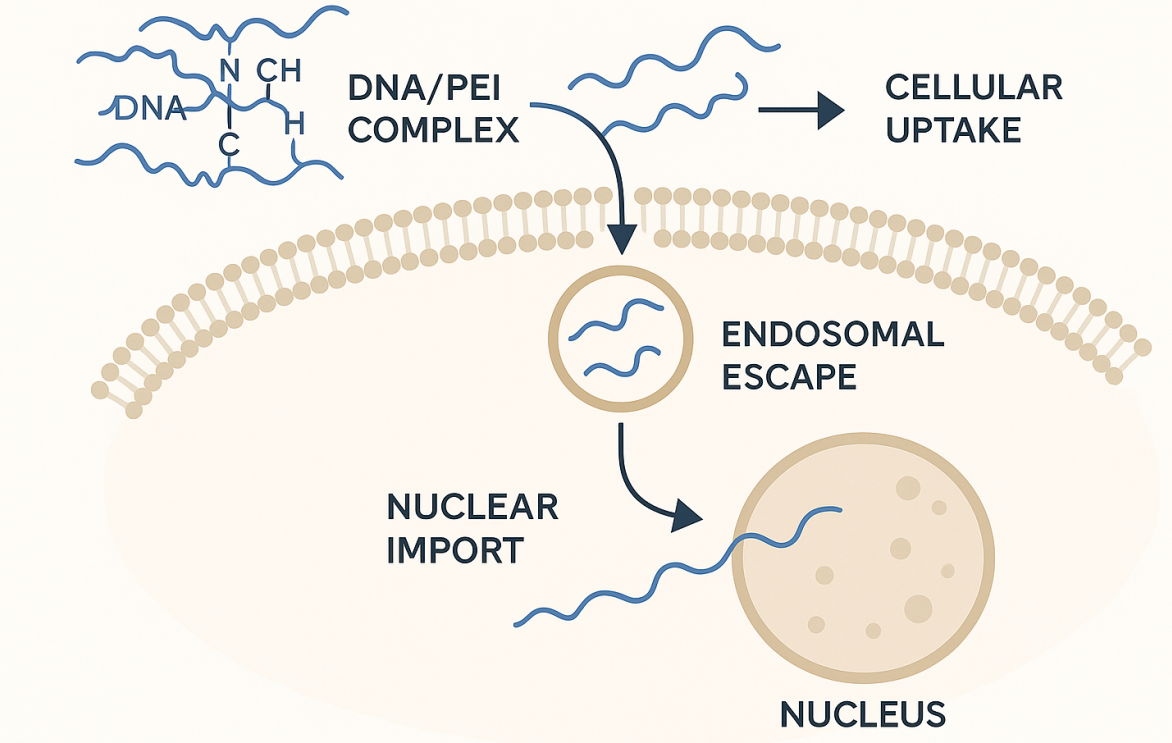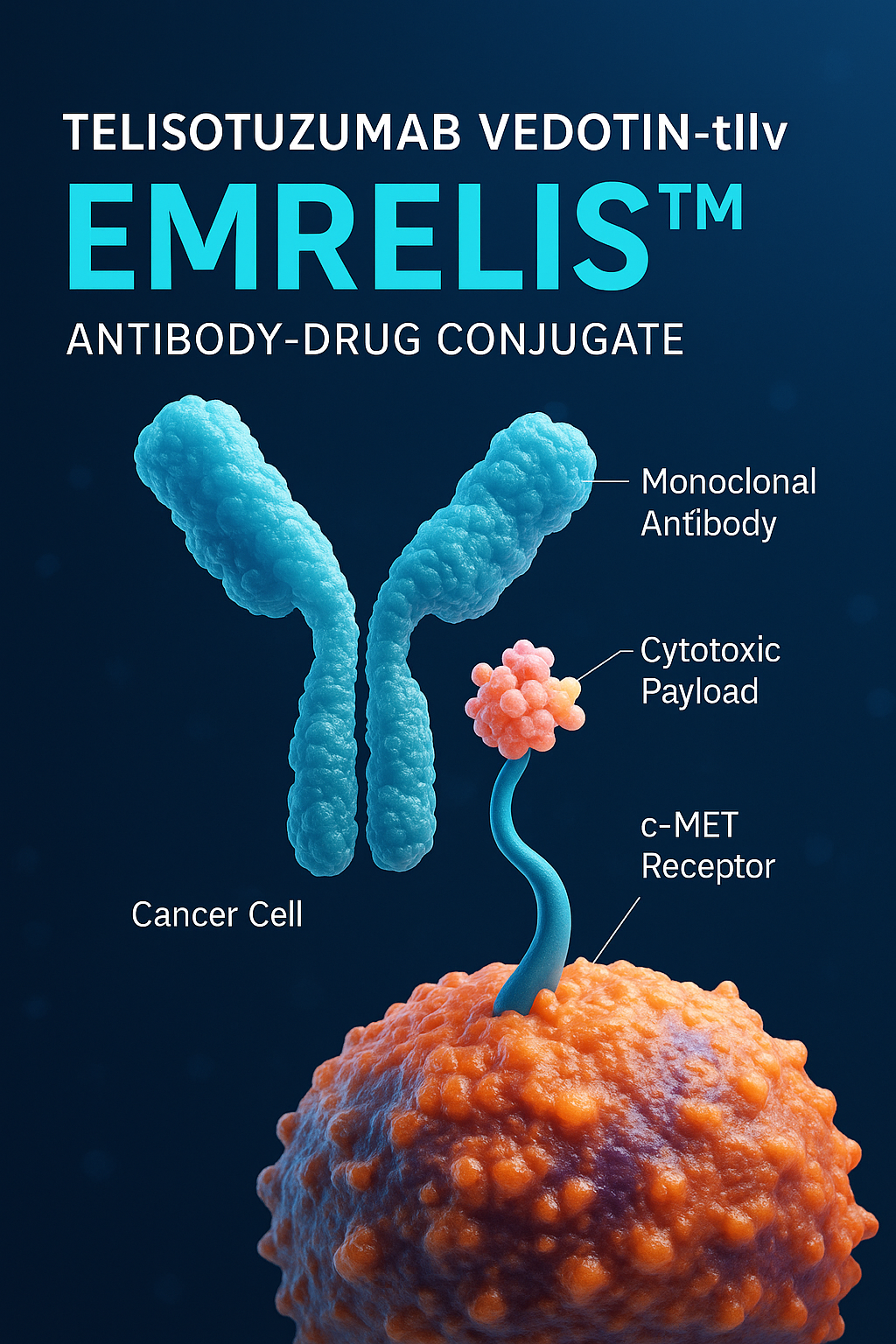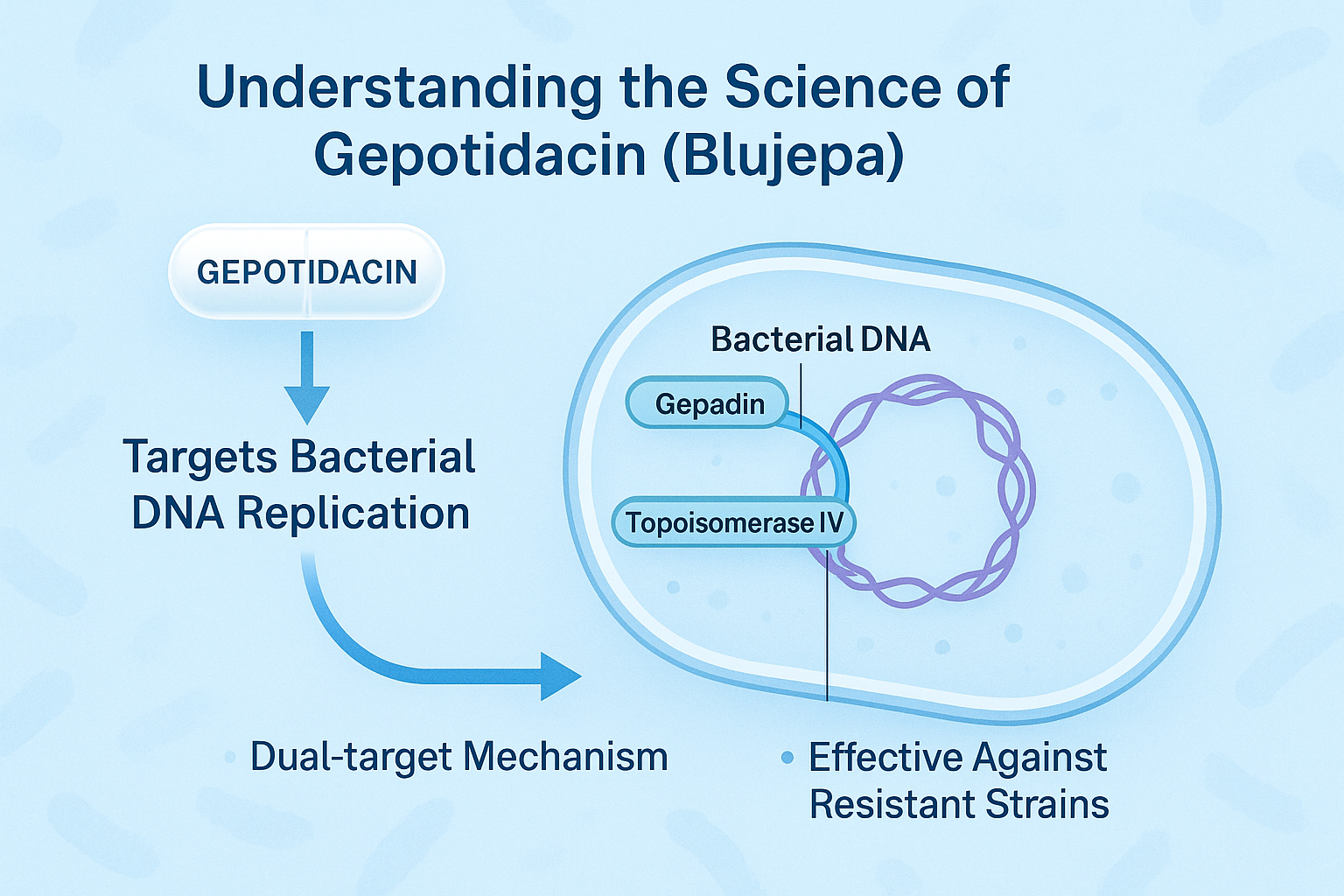Spermidine and Longevity: A Natural Molecule for Anti-Aging, Brain Health, and Cellular Renewal
Abstract
Spermidine, a naturally occurring polyamine, has garnered significant attention for its potential role in promoting healthy aging and longevity. Research highlights its ability to induce autophagy—a cellular cleanup process vital for maintaining optimal cellular function and delaying age-related decline. This compound is found in foods like wheat germ, soy products, mushrooms, and aged cheese, and is also available as a dietary supplement. Scientific studies suggest spermidine may support cognitive health, cardiovascular function, and immune regulation. While human trials are still evolving, early findings are promising. As interest in natural anti-aging interventions grows, spermidine stands out as a compelling, accessible option for supporting overall health and wellness across the lifespan.
What Is Spermidine and Why Is It Trending?
In recent years, spermidine has gained growing attention in the wellness and longevity community—and for good reason. Spermidine is a naturally occurring polyamine found in all living cells, playing a critical role in cellular function, growth, and survival. What makes this compound especially interesting is its ability to stimulate autophagy, a cellular process that helps the body clean out damaged components and regenerate healthier cells.
Autophagy has been associated with numerous health benefits, including reduced inflammation, improved metabolic function, and even increased lifespan in some organisms. As researchers began to explore how autophagy can be activated naturally, spermidine emerged as one of the most promising compounds due to its presence in food and its ability to mimic some effects of caloric restriction—one of the most studied anti-aging strategies.
Spermidine levels decline naturally with age, which has sparked interest in boosting its levels either through dietary sources or supplements. Studies in model organisms, such as yeast, worms, and mice, have shown that spermidine supplementation can extend lifespan and improve age-related functions. Human observational studies have also suggested that higher dietary intake of spermidine may be linked to reduced cardiovascular disease and lower overall mortality.
Its potential applications in anti-aging, neuroprotection, and cardiovascular health make spermidine a trending topic in both academic research and the commercial supplement world. While more human clinical trials are needed, the preliminary data suggest that this compound could be a key player in the future of preventative health.
Top Health Benefits of Spermidine Backed by Science
Spermidine is more than just a cellular compound—it’s a powerful agent that influences several critical health pathways. From promoting cellular cleanup to enhancing brain and heart health, its benefits are increasingly supported by scientific evidence. Here’s a breakdown of the most promising health benefits of spermidine:
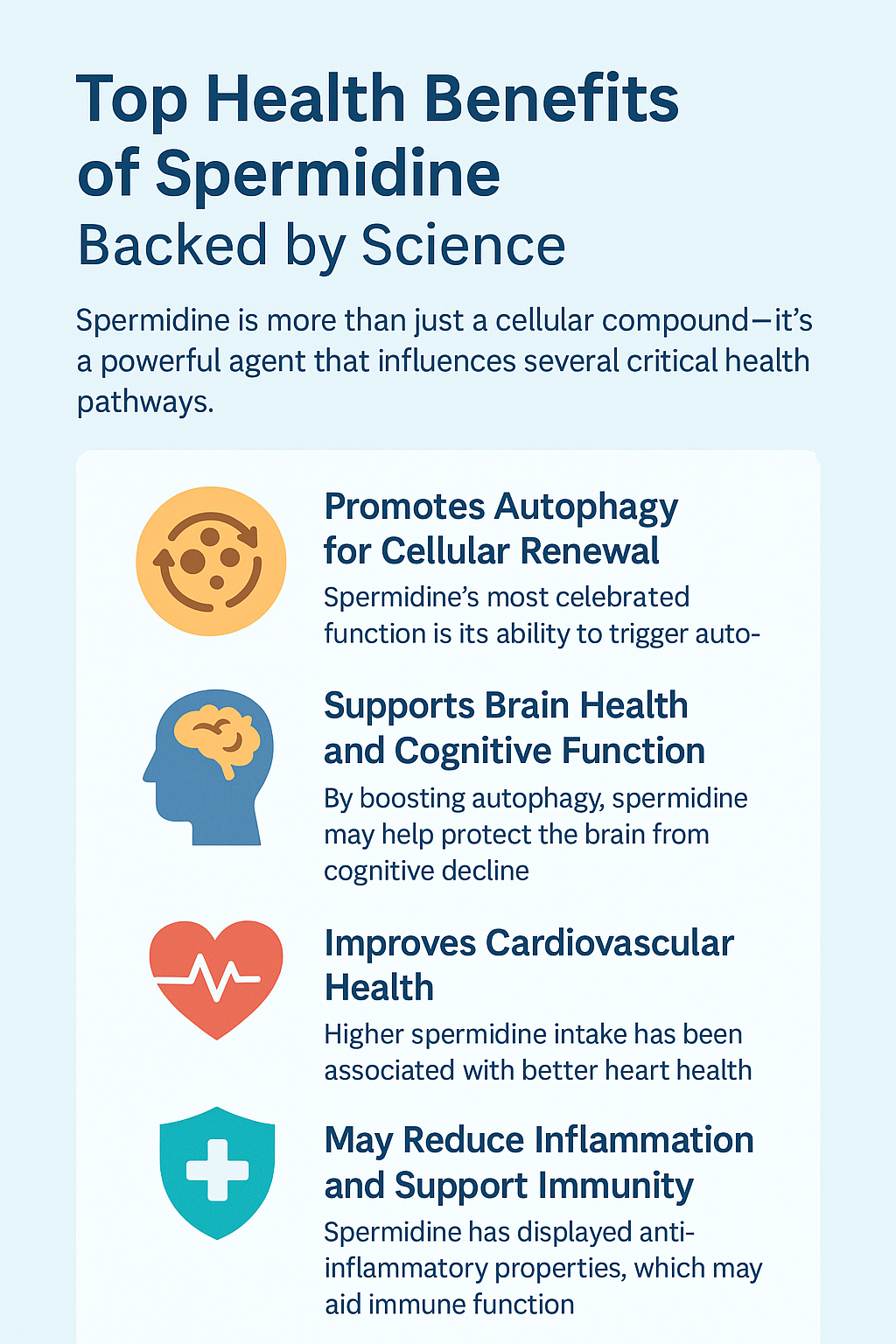
1. Promotes Autophagy for Cellular Renewal
Spermidine’s most celebrated function is its ability to trigger autophagy, a process where cells recycle waste and damaged components. This process slows down with age, but spermidine can reactivate it—helping to rejuvenate cells and support longevity. In animal studies, autophagy induced by spermidine has been linked to increased lifespan and delayed age-related decline.
2. Supports Brain Health and Cognitive Function
Neurodegenerative diseases like Alzheimer’s and Parkinson’s are linked to the accumulation of toxic proteins in the brain. By boosting autophagy, spermidine may help clear out these protein buildups, potentially protecting the brain from cognitive decline. Early studies in humans suggest improved memory performance in older adults taking spermidine-rich supplements.
3. Improves Cardiovascular Health
A large human study found that individuals with higher spermidine intake had significantly lower blood pressure and cardiovascular-related mortality. It appears to protect heart tissue, improve mitochondrial function, and reduce inflammation—all of which are essential for heart health.
4. May Reduce Inflammation and Support Immunity
Spermidine has shown anti-inflammatory properties, which are vital in controlling chronic diseases and aging. It modulates immune cell activity, helping the body respond better to infections and stress.
From longevity to neuroprotection, the evidence suggests that spermidine may be a foundational molecule for healthy aging.
Natural Sources of Spermidine in Food
One of the most appealing aspects of spermidine is that it can be naturally obtained through a spermidine-rich diet. Unlike many synthetic supplements, spermidine is abundant in everyday whole foods—particularly in plant-based and fermented products.
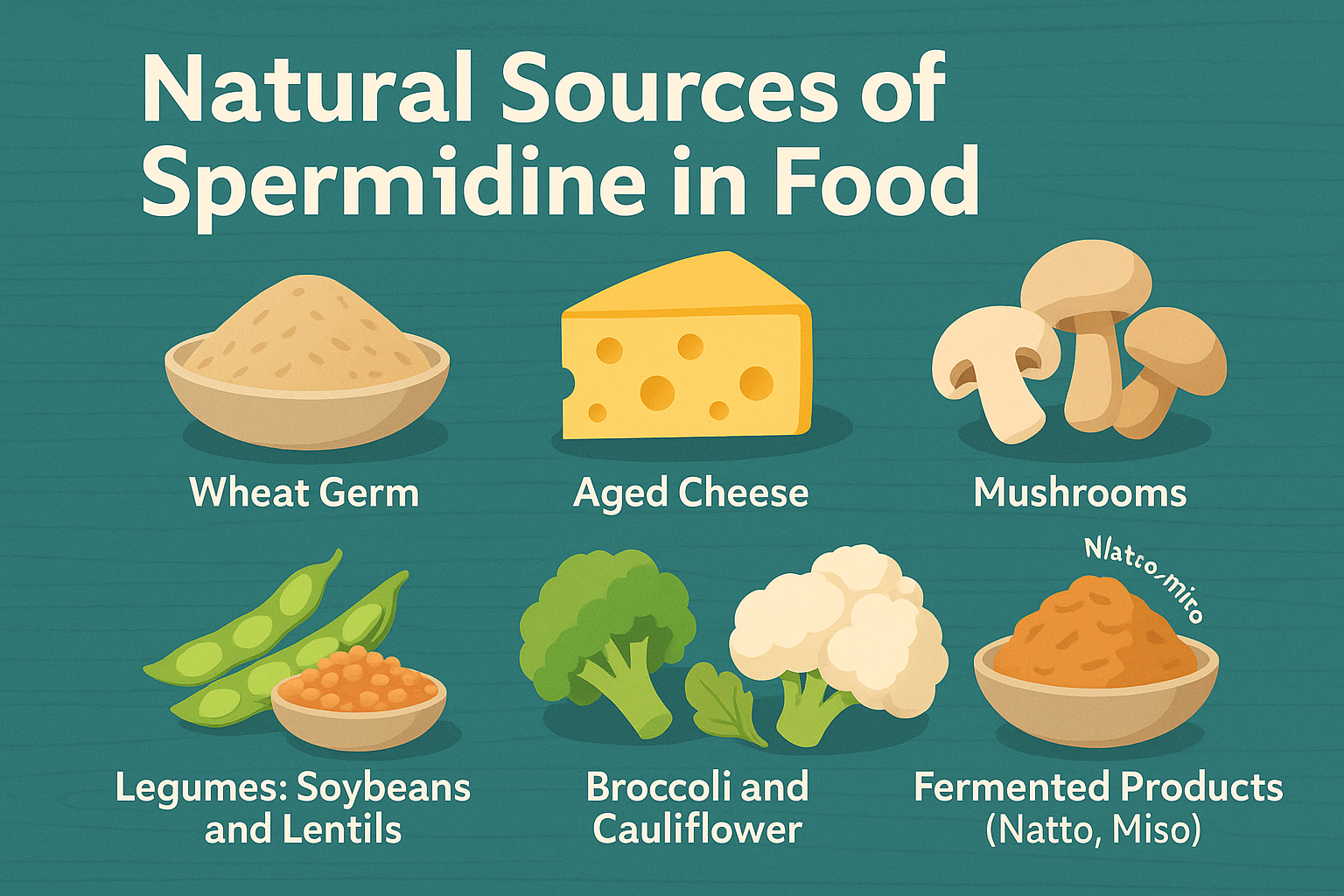
1. Wheat Germ (Highest Natural Source)
Wheat germ tops the list, with exceptionally high spermidine content. Just a small serving can significantly boost your intake. It’s easy to add to yogurt, smoothies, or baked goods.
2. Aged Cheese
Fermented foods like aged cheese, particularly cheddar and parmesan, contain notable levels of spermidine due to microbial activity during the fermentation process.
3. Mushrooms
Varieties like shiitake and maitake are excellent spermidine-rich options for plant-based diets. They also offer other health benefits like antioxidants and immune support.
4. Legumes: Soybeans and Lentils
Soy products (like natto, tempeh, and tofu) and lentils provide a natural spermidine source, while also being high in protein and fiber—making them a double win for healthy aging.
5. Broccoli and Cauliflower
Cruciferous vegetables are moderate in spermidine and rich in antioxidants, supporting cellular detox and metabolic health.
6. Fermented Products (e.g., Natto, Miso)
Fermented soy-based foods like natto and miso are potent spermidine boosters, often consumed in traditional Japanese diets linked to longevity.
How to Boost Spermidine Intake Naturally:
Mix wheat germ into oatmeal or smoothies.
Add aged cheese and mushrooms to salads.
Include lentils or fermented soy in weekly meals.
Choose whole plant-based meals that support gut health.
While supplements are an option, a spermidine-rich diet is a sustainable, natural way to increase your levels and promote cellular health.
Spermidine Supplements: What You Need to Know
While a spermidine-rich diet offers natural ways to support healthy aging, many people are turning to spermidine supplements for a more concentrated dose. But do these supplements work? And are they safe?
What Are Spermidine Supplements?
Spermidine supplements are typically derived from wheat germ extract or synthesized in labs to mimic the naturally occurring compound. They are often marketed for:
Anti-aging
Cognitive support
Cellular renewal
Cardiovascular protection
Most available products are capsules or powders, often combined with other longevity ingredients like zinc or vitamin B12.
What Does the Science Say?
Human research on spermidine supplementation is still emerging, but the findings are promising. A randomized controlled trial in older adults found that spermidine improved memory performance, especially in those with mild cognitive impairment. Other studies suggest potential benefits in blood pressure regulation and immune system balance.
Animal studies strongly support its role in extending lifespan, enhancing autophagy, and protecting heart and brain function, but more human clinical trials are needed for conclusive evidence.
Is It Safe?
So far, spermidine supplements appear safe and well-tolerated at moderate doses. However:
Long-term effects are not yet fully known.
People with medical conditions should consult a healthcare provider.
Some products vary in quality—opt for those backed by clinical trials or third-party testing.
Tips for Choosing a Supplement:
Look for “fermented wheat germ extract” as a primary ingredient.
Choose products that disclose spermidine content per dose (e.g., 1–3 mg).
Prefer third-party certified brands.
While dietary sources remain the most natural option, supplements can help fill nutritional gaps, especially in aging populations or restrictive diets.
Final Thoughts: Should You Add Spermidine to Your Health Routine?
As the science of longevity evolves, spermidine stands out as one of the most intriguing natural compounds available today. Backed by both emerging human research and decades of animal studies, spermidine shows real promise for promoting healthy aging, cellular rejuvenation, and protection against age-related decline.
If you’re looking to support your body’s natural defenses against aging, inflammation, and cognitive deterioration, spermidine might be a worthwhile addition to your daily routine—whether through foods like wheat germ and soy, or through supplementation when dietary intake is limited.
However, it’s important to approach any supplement with balanced expectations. While early studies show compelling results, spermidine is not a miracle pill, and it works best as part of a comprehensive lifestyle approach:
✅ Nutrient-dense diet
✅ Regular physical activity
✅ Stress management
✅ Sleep and recovery
✅ Evidence-based supplementation
Who May Benefit Most?
Adults 40+ seeking to slow biological aging
Individuals with family history of neurodegenerative or heart disease
People with low dietary intake of spermidine-rich foods
Biohackers and wellness enthusiasts aiming to support autophagy and cellular health
Final Note:
Always consult a qualified health practitioner before starting any new supplement, especially if you have underlying conditions or take medication.
By combining traditional dietary wisdom with cutting-edge science, spermidine may offer a natural path to living longer—and living better.
Conclusion
Spermidine is quickly emerging as a powerful natural compound in the science of healthy aging. From stimulating autophagy to supporting brain and heart health, it offers a promising path toward cellular renewal and longevity. With natural sources like wheat germ, soy, and mushrooms, as well as supplement options, it’s easier than ever to incorporate spermidine into your lifestyle. While more clinical research is needed, current evidence suggests real potential for long-term health benefits. As with any health intervention, it’s wise to consult a healthcare provider before beginning supplementation. When combined with a balanced diet and healthy habits, spermidine may become a key ally in aging well—naturally and effectively.
References
Eisenberg, T., Knauer, H., Schauer, A., et al. (2009). Induction of autophagy by spermidine promotes longevity. Nature Cell Biology, 11(11), 1305–1314.
https://www.nature.com/articles/ncb1975
Madeo, F., Eisenberg, T., Pietrocola, F., & Kroemer, G. (2018). Spermidine in health and disease. Science, 359(6374), eaan2788.
https://www.science.org/doi/abs/10.1126/science.aan2788
Kalaras, M. D., Richie, J. P., Calcagnotto, A., & Beelman, R. B. (2017). Mushrooms: A rich source of the antioxidants ergothioneine and glutathione. Food Chemistry, 233, 429–433.
https://www.sciencedirect.com/science/article/abs/pii/S030881461730691X
Schwarz, C., Stekovic, S., Wirth, M., et al. (2018). Safety and tolerability of spermidine supplementation in mice and older adults with subjective cognitive decline. Aging, 10(1), 19–33.
https://pmc.ncbi.nlm.nih.gov/articles/PMC5807086/
Hofer SJ, Simon AK, Bergmann M, Eisenberg T, Kroemer G, Madeo F. Mechanisms of spermidine-induced autophagy and geroprotection. Nat Aging. 2022 Dec;2(12):1112-1129. doi: 10.1038/s43587-022-00322-9. Epub 2022 Dec 22. PMID: 37118547.
https://www.nature.com/articles/s43587-022-00322-9
Zou D, Zhao Z, Li L, Min Y, Zhang D, Ji A, Jiang C, Wei X, Wu X. A comprehensive review of spermidine: Safety, health effects, absorption and metabolism, food materials evaluation, physical and chemical processing, and bioprocessing. Compr Rev Food Sci Food Saf. 2022 May;21(3):2820-2842. doi: 10.1111/1541-4337.12963. Epub 2022 Apr 27. PMID: 35478379.
https://ift.onlinelibrary.wiley.com/doi/abs/10.1111/1541-4337.12963

